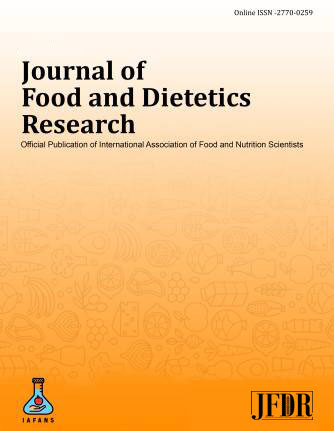Designing a Mediterranean-like Diet Plan to be Used for a Randomized Controlled Clinical Trial
DOI:
https://doi.org/10.48165/jfdr.2022.3.3.1Keywords:
Dietary, Mediterranean Dietary, Macronutrients, Food, VegetablesAbstract
Objectives: To design a Mediterranean diet (MD) that can be utilized as an intervention in a randomized controlled trial. Methods: Dietary components were proposed for a Mediterranean menu and typical Pakistani diet. Three-day menu cycles were arranged utilizing the laid-out dietary components. Recipes were created and adjusted to meet the menu objectives at the 2000 calorie level. Using this basic meal plan of 2000, we further developed meanu plans for other multiple menus to give a total of 2500, 3000, and 3500 kcal/day. Results: our results show that 100% of the grains in the Mediterranean meal plan are provided, while the typical Pakistan meal plan provided 10% of whole grain.nutrient-empty and energy-dense desserts and cakes were included for the typical Pakistani meal plan on a daily basis, while these were represented at the least by a MD meal plan. To compare the overall health promotion characteristic, the mean HEI score for the three-day menu cycle was 92.5 and 30.4 for the MD and the typical Pakistani meal plans, respectively, showing the MD diet is more superior in terms of overall health-promotion compared to the other diet plan. Results from the 10 pilot subjects show good compliance of eating their diet in accordance to MD dietary regimen. Mean HEI determined for genuine member consumption (n = 10, 6 days each) was: 92.5% and 30.4%, respectively, for the MD and typical Pakistani diet regimen.
Downloads
References
Andreo-López, M.C., Contreras-Bolívar, V., Muñoz-Torres, M., García-Fontana, B. and García-Fontana, C. (2023). Influence of the Mediterranean Diet on Healthy Aging. International Journal of Molecular Sciences, 24(5), p.4491.
Muffone, A.R.M., de Oliveira Lübke, P.D. and Rabito, E.I. (2023). Mediterranean diet and infertility: a systematic review with meta-analysis of cohort studies. Nutrition Reviews, 81(7), pp.775-789.
Ali, S., Bakht, S., Jan, A.U., Alam, I., Almajwal, A.M., Osaili, T., Obaid, R.S., Faris, M.E., Ismail, L.C., Najah, F. and Radwan, H. (2023). An innovative state-of-the-art health storytell ing technique for better management of type 2 diabetes. Frontiers in Public Health, 11.
Alam, I., Gul, R., Chong, J., Tan, C.T.Y., Chin, H.X., Wong, G., Doggui, R. and Larbi, A. (2019). Recurrent circadian fasting (RCF) improves blood pressure, biomarkers of cardiomet abolic risk and regulates inflammation in men. Journal of translational medicine, 17, pp.1-29.
Alam, I., Ali, M. and Farooq, M. (2022). Assessment of healthy eating and active lifestyle on campus environment in a univer sity setting as perceived by students using the innovative photo voice method, a healthy eating and active lifestyle (HEAL) study. Journal of Innovative Sciences, 8(1), pp.113-123.
Alam, I. (2013). Relationship between nutritional status and immune functions in elderly Pakistani men (Doctoral disser tation, Dissertation, Tübingen, Universität Tübingen, 2013).
Alam, I., Alam, I., Paracha, P.I. and Pawelec, G. (2012a). Higher estimates of daily dietary net endogenous acid produc tion (NEAP) in the elderly as compared to the young in a healthy, free-living elderly population of Pakistan. Clinical Interventions in Aging, pp.565-573.
Alam, I., Larbi, A. and Pawelec, G. (2012b). Nutritional status influences peripheral immune cell phenotypes in healthy men in rural Pakistan. Immunity & Ageing, 9, pp.1-10.
Alam, I., Shivappa, N., Hebert, J.R., Pawelec, G. and Larbi, A. (2018). Relationships between the inflammatory potential of the diet, aging and anthropometric measurements in a cross-sectional study in Pakistan. Nutrition and healthy aging, 4(4), pp.335-343.
Almajwal, A.M., Alam, I., Abulmeaty, M., Razak, S., Pawelec, G. and Alam, W. (2020). Intake of dietary advanced glycation end products influences inflammatory markers, immune phenotypes, and antiradical capacity of healthy elderly in a little‐studied population. Food science & nutrition, 8(2), pp.1046-1057.
Jan, A., Shah, S.S., Almajwal, A.M. and Alam, I. (2023). Stakeholders’ Identification and Understanding of the Multisectoral Governance for Child and Maternal Nutrition During the MDGs Period – A Stakeholders’ Network Analysis of Khyber Pakhtunkhwa Province of Pakistan, 01 November 2023, PREPRINT (Version 1) available at Research Square [https://doi.org/10.21203/rs.3.rs-3331937/v1]
Sadeghi, H., Lynch, C.F., Field, W.R., Snetselaar, L.G., Jones, M.P., Sinha, R. and Torner, J.C. (2023). Dietary omega-6/ omega-3 fatty acids and risk of prostate cancer; Is there any potential interaction by organophosphate insecticides among the agricultural health study population. Cancer epi demiology, 85, p.102410.
Schweitzer, A., Barron, B., Barron, N., McCormack, M. and Brigham, E,. (2019). Developing Mediterranean and Western Diets for an Anti-Inflammatory Feeding Trial (P12-017-19). Current Developments in Nutrition, 3, p.3013513.
Gul, R., Khan, I., Alam, I., Almajwal, A. M., Hussain, I., Sohail, N., & Hussain, M. (2023). Ramadan-Specific Nutrition Education Improves Cardio-Metabolic Health And Inflammation-A Prospective Nutrition Intervention Study From Pakistan. Frontiers in Nutrition, 10, 1204883.




